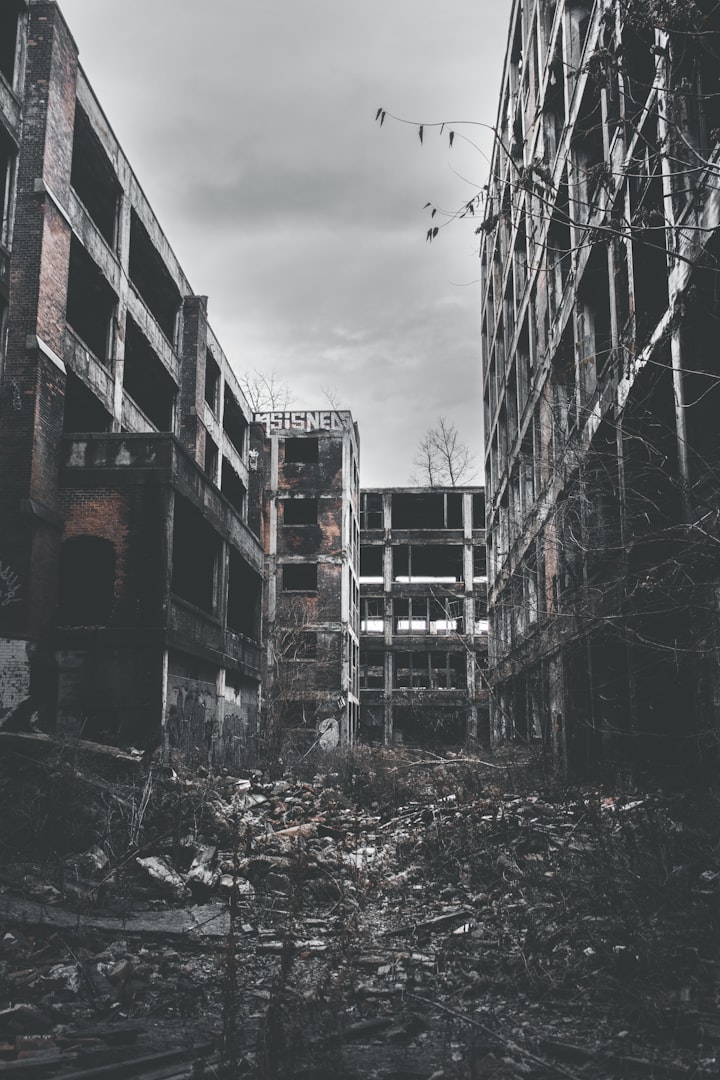
My eyes burned from the bleach as I swilled the rags in the barrel. Around me, men, women and children dressed in the same rigid white canvas uniforms scrubbed and stirred their laundry, their presence a persistent droning of voices and sloshing liquid.
“There, there,” soothed a woman over a screaming little girl, “I know the bleach stings littlun, but it’s better than being blackforx. If you got that much wind in those lungs o’ yours, I reckon you’ll be just fine.”
Something about the infant reminded me of my younger self; scared, hurting and, like many of the infants in the Wine-Racks, parentless. I, however, had at least had Toma to soothe me.
“Here,” I said, interrupting the girl’s sobs, “these may help a little.”
She looked up at me with shining eyes and took the gloves, her oversized mask drooping from her face as her mouth opened in awe.
“Saffie, you can’t be givin’ those away! You won’t come by another pair o’ those easily, they’re not like masks y’know, you can’t be makin’ bleachin’ gloves out o’ any ol’ rubbish!” The woman said, the soothing voice from a moment before now replaced by sheer incredulity.
“It’s alright, my skin is used to the burning, I can bear it a while until I can buy or find more.” I squinted a smile at the little girl from behind my own covering, patting her head as she hugged the rubbery gloves to her chest.
“What would your brother say if he saw you giving away precious supplies, eh? You have to think of yourself sometimes you crazy lass!”
“If we all did that Milde, we wouldn’t get very far in this husk of a world, now would we? If Toma saw me, he’d probably be pissed, but he’d understand.” I chuckled dryly, “Lucky for me, he’s not here to see it, so what he doesn’t know can’t hurt him.”
“I s’pose you miss him, don’t you?”
“Yeah,” I sighed, “but he’s not that far away now, only the other side of the city. In fact…I’m heading there today to make a special delivery for his birthday.”
Milde’s face paled and all the eavesdroppers around us suddenly sprung into murmured conversations of fear.
“Are you mad, girl?” she said, pulling the girl with the gloves away from me, “you got a death-wish? It’s votin’ day! Toma’s place is miles away, you won’t make it! Please Saff, go another day when all this votin’ crap is over… It’s not worth it.”
Milde raised her left hand, where three of her fingers were missing, evidence of a past voting day.
“I’ve missed the last five of his birthdays because of voting day, I’m not doing it again.”
The washerwoman shook her head, the resolve gone from her eyes.
“I can’t change your mind on this, can I?”
I looked again at her gnarled digits before shaking my head.
“I’m afraid not, Milde, but thank you,” I said, my eyes stinging anew, before turning away and walking out.
I’d mostly prepared my travel pack the night before: water, rations and a small knife made crudely out of a tin of lentils, so I only had to throw my apron in my bed nook, pick up my brother’s present and leave. The towers in the lower city were known as the Wine-Racks due to the living arrangements. Every apartment within each of the tower blocks was split into anywhere between thirty and fifty human-sized concrete pods, where we lay like unmarked bottles of cheap booze gathering dust in the cellar of the upper classes, the liquor inside long-since turned rancid to vinegar. I reached my apartment and weaved my way through the racks along the walls, sleeping arms hanging out, lovers keeping themselves warm against their stone walls, until I found my pod in the back of a room that had once been a pantry. I threw down my apron and picked up my lumpy blanket, from inside which, hidden amongst the frayed lining, I pulled out my brother’s present, his heart shaped locket.
It wasn’t really his locket, it had a faded photo inside it of a happy couple having a picnic, arms of one draped over the other’s shoulders, laughing at the camera; but Toma had loved this locket since the second he’d found it and had been distraught when he’d lost it. We’d found it when we were kids, when we made our way to the Wine-Racks from the vast concrete wastelands between the cities. Children were often abandoned in the ruins of the old civilisations, as no-one could afford another mouth to feed. Many of the abandoned passed before real infancy, but those who survived were raised by older abandoned kids and teens who now lived amongst the ruins. When we’d felt unable to survive on scraps anymore, Toma and I left our clan of lost children and joined the working world of adults in the lower city. Along the way, in a small park atop a hill, we’d found a perfectly preserved baby stroller from the time before the illnesses, which we knew we could sell for parts and start our life well-off in the city. Toma found the locket when we were cleaning it out to sell, hidden amongst some swaddling and remains of a bird’s nest. He called the women in the picture our ‘mothers’ and made up stories about them to cheer me up when times got tough. When he’d lost it, he’d fell apart, mourning as though he’d lost his true mothers to Ryburr disease or one of its variants; the thought of returning it to him now, years later, brought a warm smile to my face.
As, I stepped out into the usually bustling street, the lunacy of my mission started to dawn on me. Voting day had left the streets empty, save for a few blackforx scavenging for food or shuddering gasping breaths on the floor as they fought against the pain of their afflictions. I’d heard of voting day my whole life, but I’d never ventured out to witness it for myself. Campaigners from the upper city were said to venture into the slums looking for extra voters for their ministers, taking from you whatever they needed to count as a vote; an eye scan, a finger print- by any means possible.
“You got a spare mask miss?” called a blackforx from an alleyway next to my tower, the dark lightning-like veins of her namesake covering her face. I gulped in terror at the sight of her, but part of me ached for the woman she could have been. Her hairless skin was taught and bruised with spider veins and bloated to the point of tearing the skin, her right eye clouded with white.
“Ummm…” I began, nervously looking around to see how many other infected had heard her before pulling a bleached rag from a pocket, waving it at her and then placing it on the floor.
“Bless you miss!” she cried gleefully and began to run towards me. The sympathy within me drained away as she approached and my body instinctively leapt back several feet, my heart thumping as she drew near. The hurt was plain across her face, but she donned the mask anyway and nodded her thanks again before wandering off back down the alley. We both knew the mask wouldn’t help her, one of the many plagues throughout the world had already taken hold of her body and she was as good as dead, but it seemed to bring her comfort.
“To think they walk around maskless in the upper city…” I whispered to myself, my body still trembling from the close encounter. If she had gotten too close, mask or no mask, I could’ve been infected; it was the reason the lower city stunk of bleach, the only way to be sure the illnesses were killed. In the upper city however, they had the medicine to become immune to every disease, but most people were either too poor or too afraid to receive treatment and had to live a life of masks, stinging eyes and bleach-puckered skin.
I walked in silence through the empty streets for some time with no trouble, I watched and listened for any threat but the fear of voting day keeping the sane at bay. Suddenly as I reached the city limit, I heard a man from a few streets over screaming for mercy as a group of campaigners took what they needed from him, his screams and their laughter making me tremble, getting louder and louder in my head until my feet told me run. The ministers of the upper city were the reason the world was decaying to begin with, no cause they were rallying for could be a good one, no poor person was to be the victor in these elections. The illnesses which stemmed from across the world hundreds of years ago were ignored by the ministers. A professor Ryburr founded the first variant of a flesh-eating bacteria, but by the time they’d acknowledged it, several more had mutated spreading to the lungs, the veins and the eyes. The poor continued to die in vain until it started to affect the rich as well, at which point instead of curing the population, the rich voted to separate themselves from the poor and the classes of the world assumed their roles as either the scum or liquid in the barrel; the scum always floating on the surface of the vinegar and bleach of the slums below. My feet carried me on and on, way past the city limits, through the ruins, uphill to the highest point of the ruins I’d once grown up in, my feet finding familiar footing amongst the overgrown vines and piles of rubble. My pace slowed as my feet began to tire, my lungs stung, and my eyes were streaming; I finally came to a stop and my thoughts caught up with me. I took stock of where I was and sighed in relief, I’d reached the peak of the wasteland, the place Toma and I had once called home, the place we had found the baby stroller and declared as ‘Mothers Park’.
“Toma, I’m home…” I whispered to myself as I rounded a corner onto a small rotting patch of grass between the skeletons of Wine-Racks of an earlier civilisation, ‘a happy civilisation which our mothers enjoyed’ a young Toma would’ve told me. We liked to pretend that this tiny green with its bench and climbing frame was the place our mothers had eaten their picnic in the photo within Toma’s locket, so we made a tradition to come here every year on his birthday to have lunch as an imaginary family, borrowing hope from another time that we could all just be happy and do something as simple as having a picnic in a park without fear. I crouched down next to the bench and brushed back the overgrown vines which now covered where I had laid a heavy stone. Under this stone, was the remains of Toma, after he had become blackforx and died five years ago.
“Happy birthday Toma,” I said, taking the locket from my bag and draping it over the rock, “You’d be twenty-five today, what a great age to be!” I smiled, my heart heavy.
“I found this in the bottom of a bleaching barrel a few months after you passed and have been meaning to bring it back to you for a while. Sorry it took me so long to reach you, but your big sister is here now with our mothers, so… let’s have our picnic…”
I sat on the bench and ate my food rations whilst looking out on the ruins, the lower and upper city just visible in the distance; I told myself I would smile through the stinging of bleach in my eyes, if only until the picnic was done.
About the Creator
H.H. Callaghan
I'm a writer of prose and verse and love all aspects of literature and storytelling. I am working on some big projects, so I hope you all like my work to come! I will be posting smaller pieces in-between, so please indulge in these too.
Enjoyed the story? Support the Creator.
Subscribe for free to receive all their stories in your feed. You could also pledge your support or give them a one-off tip, letting them know you appreciate their work.






Comments (1)
What a vividly terrifying and heartbreaking world you created. Well done